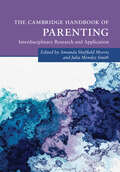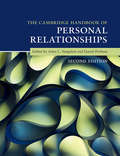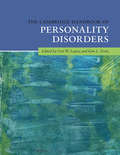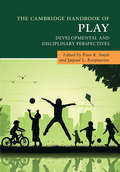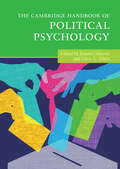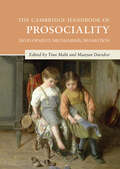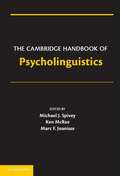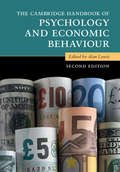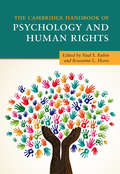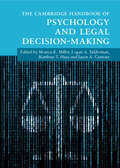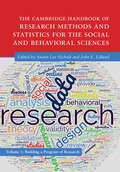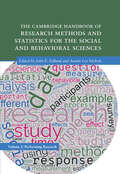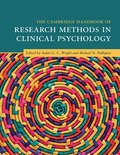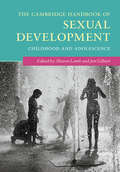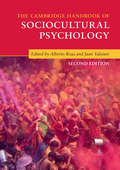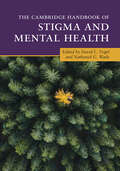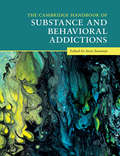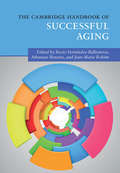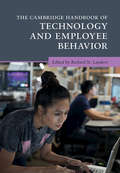- Table View
- List View
The Cambridge Handbook of Parenting (Cambridge Handbooks in Psychology)
by Amanda Sheffield Morris Julia Mendez SmithParenting is a critical influence on the development of children across the globe. This handbook brings together scholars with expertise on parenting science and interventions for a comprehensive review of current research. It begins with foundational theories and research topics, followed by sections on parenting children at different ages, factors that affect parenting such as parental mental health or socioeconomic status, and parenting children with different characteristics such as depressed and anxious children or youth who identify as LGBTQ. It concludes with a section on policy implications, as well as prevention and intervention programs that target parenting as a mechanism of change. Global perspectives and the cultural diversity of families are highlighted throughout. Offering in-depth analysis of key topics such as risky adolescent behavior, immigration policy, father engagement, family involvement in education, and balancing childcare and work, this is a vital resource for understanding the most effective policies to support parents in raising healthy children.
The Cambridge Handbook of Personal Relationships
by Anita L. Vangelisti Daniel PerlmanThe Cambridge Handbook of Personal Relationships serves as a benchmark of the current state of scholarship in this dynamic field synthesizing the extant theoretical and empirical literature, tracing its historical roots, and making recommendations for future directions. The volume addresses a broad range of established and emerging topics including: theoretical and methodological issues that influence the study of personal relationships; research and theory on relationship development, the nature and functions of personal relationships across the lifespan; individual differences and their influences on relationships; relationship processes such as cognition, emotion, and communication; relational qualities such as satisfaction and commitment; environmental influences on personal relationships; and maintenance and repair of relationships. The authors are experts from a variety of disciplines including several subfields of psychology, communication, family studies and sociology who have made major contributions to the understanding of relationships.
The Cambridge Handbook of Personal Relationships
by Anita L. Vangelisti Daniel PerlmanWith the field of personal relationships having grown dramatically in the past quarter century, The Cambridge Handbook of Personal Relationships, Second Edition serves as a benchmark of the current state of scholarship, synthesizing the extant theoretical and empirical literature, tracing its historical roots, and making recommendations for future directions. Written by internationally known experts from key disciplines, the Handbook addresses both fundamental questions and cutting-edge concerns. This second edition has been thoroughly updated to reflect recent developments in analytical techniques, shifts in theoretical emphases, and an increased attention to social processes. New chapters include the Neuroscience of Salutary Close Relationships; Self-Disclosure in Relationships; Acceptance, Rejection, and the Quest for Relational Value; Relationships and Physical Health; Personal Relationships and Technology in the Digital Age; and Promoting Healthy Relationships. This compendium of state-of-the-art research and theory on personal relationships will be of great value to researchers, graduate students, and practitioners.
The Cambridge Handbook of Personality Disorders (Cambridge Handbooks in Psychology)
by Kim L. Gratz Carl W. LejuezThis Handbook provides both breadth and depth regarding current approaches to the understanding, assessment, and treatment of personality disorders. The five parts of the book address etiology; models; individual disorders and clusters; assessment; and treatment. A comprehensive picture of personality pathology is supplied that acknowledges the contributions and missteps of the past, identifies the crucial questions of the present, and sets a course for the future. It also follows the changes the Diagnostic and Statistical Manual of Mental Disorders (DSM–5) has triggered in the field of personality disorders. The editors take a unique approach where all chapters include two commentaries by experts in the field, as well as an author rejoinder. This approach engages multiple perspectives and an exchange of ideas. It is the ideal resource for researchers and treatment providers at all career stages.
The Cambridge Handbook of Play: Developmental and Disciplinary Perspectives (Cambridge Handbooks in Psychology)
by Jaipaul L. Roopnarine Peter K. SmithPlay takes up much of the time budget of young children, and many animals, but its importance in development remains contested. This comprehensive collection brings together multidisciplinary and developmental perspectives on the forms and functions of play in animals, children in different societies, and through the lifespan. The Cambridge Handbook of Play covers the evolution of play in animals, especially mammals; the development of play from infancy through childhood and into adulthood; historical and anthropological perspectives on play; theories and methodologies; the role of play in children's learning; play in special groups such as children with impairments, or suffering political violence; and the practical applications of playwork and play therapy. Written by an international team of scholars from diverse disciplines such as psychology, education, neuroscience, sociology, evolutionary biology and anthropology, this essential reference presents the current state of the field in play research.
The Cambridge Handbook of Political Psychology (Cambridge Handbooks in Psychology)
by Chris G. Sibley Danny OsborneThe Cambridge Handbook of Political Psychology provides a comprehensive review of the psychology of political behaviour from an international perspective. Its coverage spans from foundational approaches to political psychology, including the evolutionary, personality and developmental roots of political attitudes, to contemporary challenges to governance, including populism, hate speech, conspiracy beliefs, inequality, climate change and cyberterrorism. Each chapter features cutting-edge research from internationally renowned scholars who offer their unique insights into how people think, feel and act in different political contexts. By taking a distinctively international approach, this handbook highlights the nuances of political behaviour across cultures and geographical regions, as well as the truisms of political psychology that transcend context. Academics, graduate students and practitioners alike, as well as those generally interested in politics and human behaviour, will benefit from this definitive overview of how people shape – and are shaped by – their political environment in a rapidly changing twenty-first century.
The Cambridge Handbook of Prosociality: Development, Mechanisms, Promotion (Cambridge Handbooks in Psychology)
by Tina Malti Maayan DavidovProsociality is a multifaceted concept referring to the many ways in which individuals care about and benefit others. Human prosociality is foundational to social harmony, happiness, and peace; it is therefore essential to understand its underpinnings, development, and cultivation. This handbook provides a state-of-the-art, in-depth account of scientific, theoretical, and practical knowledge regarding prosociality and its development. Its thirty chapters, written by international researchers in the field, elucidate key issues, including: the development of prosociality across infancy, childhood, adolescence, and beyond; the biological, cognitive, emotional, and motivational mechanisms that underlie and influence prosociality; how different socialization agents and social contexts can affect children's prosociality; and intervention approaches aimed at cultivating prosociality in children and adolescents. This knowledge can benefit researchers, students, practitioners, and policy makers seeking to nurture socially responsible, caring youth.
The Cambridge Handbook of Psycholinguistics
by Michael J. Spivey Ken Mcrae Marc F. JoanisseOur ability to speak, write, understand speech, and read is critical to our ability to function in today's society. As such, psycholinguistics, or the study of how humans learn and use language, is a central topic in cognitive science. This comprehensive handbook is a collection of chapters written not by practitioners in the field, who can summarize the work going on around them, but by trailblazers from a wide array of subfields, who have been shaping the field of psycholinguistics over the last decade. Some topics discussed include how children learn language, how average adults understand and produce language, how language is represented in the brain, how brain-damaged individuals perform in terms of their language abilities, and computer-based models of language and meaning. This is required reading for advanced researchers, graduate students, and upper-level undergraduates who are interested in the recent developments and the future of psycholinguistics.
The Cambridge Handbook of Psychology and Economic Behaviour (Cambridge Handbooks in Psychology)
by Alan LewisPsychologists have been observing and interpreting economic behaviour for at least fifty years, and the last decade, in particular, has seen an escalated interest in the interface between psychology and economics. The Cambridge Handbook of Psychology and Economic Behaviour is a valuable reference resource dedicated to improving our understanding of the economic mind and economic behaviour. Employing empirical methods - including laboratory experiments, field experiments, observations, questionnaires and interviews - the Handbook covers aspects of theory and method, financial and consumer behaviour, the environment, and biological perspectives. With contributions from distinguished scholars from a variety of countries and backgrounds, the Handbook is an important step forward in the improvement of communications between the disciplines of psychology and economics. It will appeal to academic researchers and graduates in economic psychology and behavioural economics.
The Cambridge Handbook of Psychology and Human Rights (Cambridge Handbooks in Psychology)
by Neal S. Rubin Roseanne L. FloresWritten by psychologists, historians, and lawyers, this handbook demonstrates the central role psychological science plays in addressing some of the world's most pressing problems. Over 100 experts from around the world work together to supply an integrated history of human rights and psychological science using a rights and strengths-based perspective. It highlights what psychologists have done to promote human rights and what continues to be done at the United Nations. With emerging visions for the future uses of psychological theory, education, evidence-based research, and best practices, the chapters offer advice on how to advance the 2030 Global Agenda on Sustainable Development. Challenging the view that human rights are best understood through a political lens, this scholarly collection of essays shows how psychological science may hold the key to nurturing humanitarian values and respect for human dignity.
The Cambridge Handbook of Psychology and Legal Decision-Making (Cambridge Handbooks in Psychology)
by Monica K. Miller Matthew T. Huss Logan A. Yelderman Jason A. CantonePresenting state-of-the-art research, this Handbook summarises emerging and establishing topics in the area of legal decision-making. Interdisciplinary in its approach, it covers decisions made within the criminal justice system, the trial process, and clinical settings. Chapters, written by accomplished academics and experts in the field, synthesize historical context, identify gaps in existing literature, propose future directions of study, and discuss policy limitations. It also includes 'perspectives from the field' essays written by professionals – a judge, an attorney, a police officer, a trial consultant, and a probation officer – to bridge the gap between academic research and its application to the real world. It is intended as a go-to resource for students and researchers who want to immerse themselves in a body of scientific research to understand its history and shape its future.
The Cambridge Handbook of Research Methods and Statistics for the Social and Behavioral Sciences: Volume 1: Building a Program of Research (Cambridge Handbooks in Psychology)
by John E. Edlund Austin Lee NicholsThe first of three volumes, the five sections of this book cover a variety of issues important in developing, designing, and analyzing data to produce high-quality research efforts and cultivate a productive research career. First, leading scholars from around the world provide a step-by-step guide to doing research in the social and behavioral sciences. After discussing some of the basics, the various authors next focus on the important building blocks of any study. In section three, various types of quantitative and qualitative research designs are discussed, and advice is provided regarding best practices of each. The volume then provides an introduction to a variety of important and cutting-edge statistical analyses. In the last section of the volume, nine chapters provide information related to what it takes to have a long and successful research career. Throughout the book, example and real-world research efforts from dozens of different disciplines are discussed.
The Cambridge Handbook of Research Methods and Statistics for the Social and Behavioral Sciences: Volume 2: Performing Research (Cambridge Handbooks in Psychology)
by John E. Edlund Austin Lee NicholsIn a time where new research methods are constantly being developed and science is evolving, researchers must continually educate themselves on cutting-edge methods and best practices related to their field. The second of three volumes, this Handbook provides comprehensive and up-to-date coverage of a variety of issues important in developing, designing, and collecting data to produce high-quality research efforts. First, leading scholars from around the world provide an in depth explanation of various advanced methodological techniques. In section two, chapters cover general important methodological considerations across all types of data collection. In the third section, the chapters cover self-report and behavioral measures and their considerations for use. In the fourth section, various psychological measures are covered. The final section of the handbook covers issues that directly concern qualitative data collection approaches. Throughout the book, examples and real-world research efforts from dozens of different disciplines are discussed.
The Cambridge Handbook of Research Methods in Clinical Psychology (Cambridge Handbooks in Psychology)
by Wright Aidan G. C. Michael N. HallquistThis book integrates philosophy of science, data acquisition methods, and statistical modeling techniques to present readers with a forward-thinking perspective on clinical science. It reviews modern research practices in clinical psychology that support the goals of psychological science, study designs that promote good research, and quantitative methods that can test specific scientific questions. It covers new themes in research including intensive longitudinal designs, neurobiology, developmental psychopathology, and advanced computational methods such as machine learning. Core chapters examine significant statistical topics, for example missing data, causality, meta-analysis, latent variable analysis, and dyadic data analysis. A balanced overview of observational and experimental designs is also supplied, including preclinical research and intervention science. This is a foundational resource that supports the methodological training of the current and future generations of clinical psychological scientists.
The Cambridge Handbook of Second Language Acquisition
by Julia Herschensohn Martha Young-ScholtenWhat is language and how can we investigate its acquisition by children or adults? What perspectives exist from which to view acquisition? What internal constraints and external factors shape acquisition? What are the properties of interlanguage systems? This comprehensive 31-chapter handbook is an authoritative survey of second language acquisition (SLA). Its multi-perspective synopsis on recent developments in SLA research provides significant contributions by established experts and widely recognized younger talent. It covers cutting edge and emerging areas of enquiry not treated elsewhere in a single handbook, including third language acquisition, electronic communication, incomplete first language acquisition, alphabetic literacy and SLA, affect and the brain, discourse and identity. Written to be accessible to newcomers as well as experienced scholars of SLA, the Handbook is organised into six thematic sections, each with an editor-written introduction.
The Cambridge Handbook of Sexual Development: Childhood and Adolescence (Cambridge Handbooks in Psychology)
by Sharon Lamb Jen GilbertThe Cambridge Handbook of Sexual Development is a carefully curated conversation that brings together the top researchers in child and adolescent sexual development to redefine the issues, conflicts, and debates in the field. The Handbook is organized around three foundational questions: first, what is sexual development? Second, how do we study sexual development? And third, what roles might adults - including the institutions of the media, family, and education - play in the sexual development of children and adolescents? As the first of its kind, this collection integrates work from sociology, psychology, anthropology, history, education, cultural studies, and allied fields. Writing from different disciplinary traditions and about a range of international contexts, the contributors explore the role of sexuality in children's and adolescents' everyday experiences of identity, family, school, neighborhood, religion, and popular media.
The Cambridge Handbook of Situated Cognition
by Philip Robbins Murat AydedeSince its inception some fifty years ago, cognitive science has seen a number of sea changes. Perhaps the best known is the development of connectionist models of cognition as an alternative to classical, symbol-based approaches. A more recent - and increasingly influential - trend is that of dynamical-systems-based, ecologically oriented models of the mind. Researchers suggest that a full understanding of the mind will require systematic study of the dynamics of interaction between mind, body, and world. Some argue that this new orientation calls for a revolutionary new metaphysics of mind, according to which mental states and processes, and even persons, literally extend into the environment. This is a state-of-the-art guide to this new movement in cognitive science. Each chapter tackles either a specific area of empirical research or specific sector of the conceptual foundation underlying this research.
The Cambridge Handbook of Social Representations
by Jaan Valsiner Sammut, Gordon and Andreouli, Eleni and Gaskell, George and Valsiner, Jaan Gordon Sammut Eleni Andreouli George GaskellA social representations approach offers an empirical utility for addressing myriad social concerns such as social order, ecological sustainability, national identity, racism, religious communities, the public understanding of science, health and social marketing. The core aspects of social representations theory have been debated over many years and some still remain widely misunderstood. This Handbook provides an overview of these core aspects and brings together theoretical strands and developments in the theory, some of which have become pillars in the social sciences in their own right. Academics and students in the social sciences working with concepts and methods such as social identity, discursive psychology, positioning theory, semiotics, attitudes, risk perception and social values will find this an invaluable resource.
The Cambridge Handbook of Sociocultural Psychology
by Jaan Valsiner Alberto RosaThis book, first published in 2007, is an international overview of the state of our knowledge in sociocultural psychology - as a discipline located at the crossroads between the natural and social sciences and the humanities. Since the 1980s, the field of psychology has encountered the growth of a new discipline - cultural psychology - that has built new connections between psychology, sociology, anthropology, history and semiotics. The handbook integrates contributions of sociocultural specialists from fifteen countries, all tied together by the unifying focus on the role of sign systems in human relations with the environment. It emphasizes theoretical and methodological discussions on the cultural nature of human psychological phenomena, moving on to show how meaning is a natural feature of action and how it eventually produces conventional symbols for communication. Such symbols shape individual experiences and create the conditions for consciousness and the self to emerge; turn social norms into ethics; and set history into motion.
The Cambridge Handbook of Sociocultural Psychology (Cambridge Handbooks in Psychology)
by Jaan Valsiner Alberto RosaSociocultural psychology is a discipline located at the crossroads between the natural and social sciences and the humanities. This international overview of the field provides an antireductionist and comprehensive account of how experience and behaviour arise from human action with cultural materials in social practices. The outcome is a vision of the dynamics of sociocultural and personal life in which time and developmental constructive transformations are crucial. This second edition provides expanded coverage of how particular cultural artefacts and social practices shape experience and behaviour in the realms of art and aesthetics, economics, history, religion and politics. Special attention is also paid to the development of identity, the self and personhood throughout the lifespan, while retaining the emphasis on experience and development as key features of sociocultural psychology.
The Cambridge Handbook of Stigma and Mental Health (Cambridge Handbooks in Psychology)
by Nathaniel G. Wade David L. VogelThe persistence of stigma of mental illness and seeking therapy perpetuates suffering and keeps people from getting the help they need and deserve. This volume, analysing the most up-to-date research on this process and ways to intervene, is designed to give those who are working to overcome stigma a strong, research-based foundation for their work. Chapters address stigma reduction efforts at the individual, community, and national levels, and discuss what works and what doesn't. Others explore how holding different stigmatized identities compounds the burden of stigma and suggest ways to attend to these differences. Throughout, there is a focus on the current state of the research knowledge in the field, its applications, and recommendations for future research. The Handbook provides a compelling case for the benefits reaped from current research and intervention, and shows why continued work is needed.
The Cambridge Handbook of Substance and Behavioral Addictions (Cambridge Handbooks in Psychology)
by Steve SussmanWritten by leaders in the addictions field, 100 authors from six countries, this handbook is a thoroughly comprehensive resource. Philosophical and legal issues are addressed, while conceptual underpinnings are provided through explanations of appetitive motivation, incentive sensitization, reward deficiency, and behavioral economics theories. Major clinical and research methods are clearly mapped out (e.g. MRI, behavioral economics, interview assessments, and qualitative approaches), outlining their strengths and weaknesses, giving the reader the tools needed to guide their research and practice aims. The etiology of addiction at various levels of analysis is discussed, including neurobiology, cognition, groups, culture, and environment, which simultaneously lays out the foundations and high-level discourse to serve both novice and expert researchers and clinicians. Importantly, the volume explores the prevention and treatment of such addictions as alcohol, tobacco, novel drugs, food, gambling, sex, work, shopping, the internet, and several seldom-investigated behaviors (e.g. love, tanning, or exercise).
The Cambridge Handbook of Successful Aging (Cambridge Handbooks in Psychology)
by Rocío Fernández-Ballesteros Athanase Benetos Jean-Marie RobineRecent studies show that more people than ever before are reaching old age in better health and enjoying that health for a longer time. This Handbook outlines the latest discoveries in the study of aging from bio-medicine, psychology, and socio-demography. It treats the study of aging as a multidisciplinary scientific subject, since it requires the interplay of broad disciplines, while offering high motivation, positive attitudes, and behaviors for aging well, and lifestyle changes that will help people to stay healthier across life span and in old age. Written by leading scholars from various academic disciplines, the chapters delve into the most topical aspects of aging today - including biological mechanisms of aging, aging with health, active and productive aging, aging with satisfaction, aging with respect, and aging with dignity. Aimed at health professionals as well as general readers, this Cambridge Handbook offers a new, positive approach to later life.
The Cambridge Handbook of Technology and Employee Behavior (Cambridge Handbooks in Psychology)
by Richard N. LandersExperts from across all industrial-organizational (IO) psychology describe how increasingly rapid technological change has affected the field. In each chapter, authors describe how this has altered the meaning of IO research within a particular subdomain and what steps must be taken to avoid IO research from becoming obsolete. This Handbook presents a forward-looking review of IO psychology's understanding of both workplace technology and how technology is used in IO research methods. Using interdisciplinary perspectives to further this understanding and serving as a focal text from which this research will grow, it tackles three main questions facing the field. First, how has technology affected IO psychological theory and practice to date? Second, given the current trends in both research and practice, could IO psychological theories be rendered obsolete? Third, what are the highest priorities for both research and practice to ensure IO psychology remains appropriately engaged with technology moving forward?
The Cambridge Handbook of Violent Behavior and Aggression
by Daniel J. Flannery Alexander T. Vazsonyi Irwin D. Waldman Daniel J. Flannery Alexander T. Vazsonyi Irwin D. WaldmanFrom a team of leading experts comes a comprehensive, multidisciplinary examination of the most current research including the complex issue of violence and violent behavior. The handbook examines a range of theoretical, policy, and research issues and provides a comprehensive overview of aggressive and violent behavior. The breadth of coverage is impressive, ranging from research on biological factors related to violence and behavior-genetics to research on terrrorism and the impact of violence in different cultures. The authors examine violence from international cross-cultural perspectives, with chapters that examine both quantitative and qualitative research. They also look at violence at multiple levels: individual, family, neighborhood, cultural, and across multiple perspectives and systems, including treatment, justice, education, and public health.
